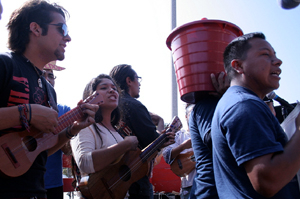Tomato Pickers: Trader Joe’s Is Rotten

Florida’s tomato farmworkers and their long-time community allies brought a two-year fight to specialty grocer Trader Joe’s doorstep last week, marching and rallying at its Southern California headquarters.
Four hundred stopped by a Trader Joe’s store for a picket and a short rally last Friday, which ended with Darniel Sales, a member of the Coalition of Immokalee Workers, carrying a full 35-pound bucket of tomatoes that was passed like a solidarity baton along the march.
As CIW marchers arrived at Trader Joe’s headquarters near Los Angeles, they were led in prayer by local clergy. A street-theater performance mocked the two-faced nature of the company, which proclaims its responsibility but fails to commit to what the farmworkers ask—an agreement that guarantees one penny more for each pound of tomatoes they pick.
A delegation attempted to deliver a letter of support from 200 rabbis to chants of “let them in!” but company officials refused to see them.
So far, Trader Joe’s has tried to sidestep the CIW campaign, which has picketed stores nationwide.
“The company wants us to take them on their word, but what that actually means is that we have no way of ensuring that Trader Joe’s is buying tomatoes only from growers who abide by the CIW’s fair food code of conduct,” said Oscar Otzoy, a CIW member and tomato worker.
CIW’s code of conduct has raised standards for tomatoes purchased by nine retail food industry giants, including McDonald’s, Burger King, and Whole Foods. The centerpiece of the CIW agreement is the extra penny per pound, which has lifted wages by up to 65 percent for farmworkers—most of whom haven’t seen their piece rate adjusted in three decades.
After coming to agreements with these corporations, the stage was set for raising the bar throughout an industry where workers do intense labor that involves picking up to 2 tons of tomatoes per day in the Florida sun, sometimes facing extraordinary abuse. Eight cases of modern-day slavery involving more than 1,000 Florida farmworkers have been exposed and prosecuted with the CIW’s help.
Even if McDonald’s and Whole Foods control what farmworkers are paid, they don’t employ farmworkers—growers do. So the coalition signed an agreement last year with the Florida Tomato Growers Exchange, the industry’s trade group, which has agreed that its growers will pass along the penny per pound to workers. They also agreed to transparency so that the CIW can monitor the pass-through.
Despite having the growers’ group and nine major commercial tomato consumers on board, the CIW’s gains have not spread widely throughout the Florida fields.

SUPPORT LABOR NOTES
BECOME A MONTHLY DONOR
Give $10 a month or more and get our "Fight the Boss, Build the Union" T-shirt.
“The fair food program has not reached its full potential, because major grocery outlets like Publix, Ahold, and Trader Joe’s are refusing to do the right thing,” said Joe Parker, a Student Farm Worker Alliance organizer.
OUT OF STEP
Trader Joe’s seems to recognize how far out of step it is. The company claimed the day before the last week’s action that they have agreed to buy tomatoes from Florida farms covered by the CIW agreement. They also claimed to have included a surcharge in their tomato contracts which could cover the wage increase.
But Trader Joe’s refuses to sign on to the code of conduct that would guarantee the pay raise gets to the workers. An agreement would also bring transparency in implementing the code, which includes access to water and shade during breaktime. In a letter to an exasperated ex-customer in late October, the company said, “The CIW, an entity with which we have no business relationship, continues to demand that we sign an agreement with them that is unacceptable to us.”
“How would Trader Joe’s know whether a grower is actually adhering to the code of conduct or not?” asked Cruz Salucio, a tomato worker and CIW member, adding that companies that rely on their contractors to self-report abuses don’t find many.
Trader Joe’s is privately owned, but CIW estimates it had more than $8 billion dollars in sales last year. Farmworkers say the corporation’s resistance is not about paying an extra penny—it’s about control.
CIW has seen this kind of reaction before. California was home base for the coalition’s successful nationwide boycott of Taco Bell that marked the beginning of a long streak of campaign victories for fair food activists.
“In a way it’s a blessing to have Trader Joe's headquarters in California,” Salucio said. “Our first major victory was in this state and we have thousands of dedicated supporters, new and old.”
Parker says the campaign is having an impact. Trader Joe’s is starting to write back to high school students who write letters in support of the farmworkers.
“They’re worried about the effects of our campaign on their bottom line and public image,” he said. As the company continues to dodge accountability, “all we can say is expect things to heat up.”





